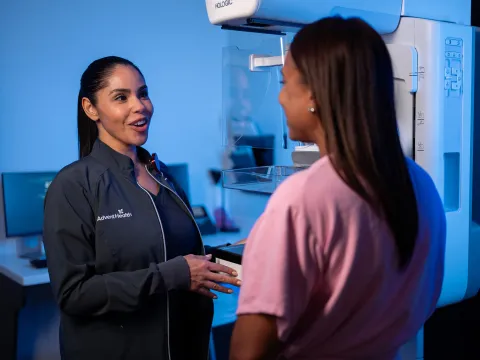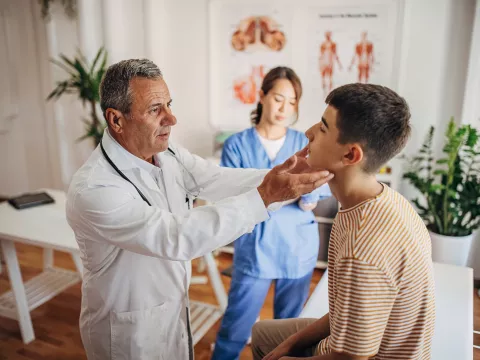- AdventHealth

Choose the health content that’s right for you, and get it delivered right in your inbox.
The research is clear: Breast cancer is on the rise throughout the world, and close to home here in the U.S., too. According to the latest data from the World Health Organization and the American Cancer Society:
- Breast cancer is the world’s second most common cancer, surpassed only by lung cancer.
- Breast cancer is the most common cancer among American women, and the second-leading cause of cancer deaths in the U.S.
- An estimated 316,950 new cases of invasive breast cancer will be diagnosed in American women in 2025, along with 59,080 new cases of noninvasive breast cancer.
- About 1 in 8 American women will receive a breast cancer diagnosis in their lifetime.
These are staggering numbers. And behind every number is a person who matters. We’re here with our board-certified breast surgeon, Kyle Bowers, MD, to help you understand more about breast cancer so you’re well-equipped with information that could help you catch it early and stop it from spreading. And while we hope you never face a diagnosis, rest assured that if you do, you’ll have an expert team at your side to support your whole health with expertise and compassion.
Preventive Care: Getting Your Mammogram
Many women experience no symptoms of breast cancer. That’s why annual mammograms are still the top recommended screening for women, allowing the earliest possible detection of breast cancer — even before you experience symptoms, if at all.
“Decades of research show that breast cancer is more likely to be detected early in women who have regular mammograms,” Dr. Bowers explains.
When to Start Getting Mammograms
If you’re between the ages of 20 and 40 and are not at a high risk for breast cancer, you should have a clinical breast exam by your doctor every three years at a minimum.
If you’re 40 or older, an annual screening mammogram is recommended until at least age 75. However, some women should start getting mammograms before 40, so talk to your doctor about the right screening schedule for you, and if you could benefit from having an advanced mammogram for dense breasts.
What Happens if You’re Diagnosed With Breast Cancer
If you receive a breast cancer diagnosis, the first step is finding the right treatment for you.
“A breast cancer treatment program should offer one-on-one support from an expert team with options for your specific condition,” says Dr. Bowers. “Know that if you’re diagnosed with breast cancer, we’re by your side at every step. We offer advanced treatments and personalized care with your whole health in mind.”
Breast cancer stages and types help us determine the most effective course of action. Depending on your stage and type, your treatment options and follow-up care might include:
- Chemotherapy: Chemotherapy uses medications to destroy cancer cells by interrupting cell division. Chemo can stop cancer from spreading, ease symptoms by shrinking tumors and possibly cure cancer.
- Radiation therapy: Radiation therapy targets specific areas of the body, shrinking tumors and eliminating cancer cells by damaging their DNA.
- Surgery: Our fellowship-trained surgeons treat tumors with techniques that optimize each patient’s recovery. Types of breast cancer surgery include lumpectomy, mastectomy and post-treatment resection.
- Targeted therapy: We provide several types of targeted therapies, including hormone therapy and immunotherapy, that more precisely identify and eliminate cancer cells.
Our experienced oncologists will work with you to understand your specific diagnosis and design a treatment plan that considers your comfort, safety and healing.
Awareness Is Power: Take the Next Step to Prevent or Treat Breast Cancer
“While preventing breast cancer is ideal, overcoming breast cancer is our goal for every patient. And we will work tirelessly to achieve it,” Dr. Bowers says.
Wherever you are in your breast health journey, we’re here to guide you with annual screening mammograms and proven treatments for breast cancer.
Schedule a Mammogram
If you’re due for your annual screening mammogram, there’s no better time than right now to put your health first. Schedule a mammogram today at one of our conveniently located imaging centers.
Get Started With Treatment
If you're experiencing breast cancer symptoms or have a diagnosis, count on our teams at AdventHealth. We’ll be by your side for every appointment and treatment, answering your questions, easing your mind and lifting your spirit. To schedule your visit with Dr. Bowers in Tampa or Wesley Chapel, request an appointment online or call us at 813-978-8315.
Recent Blogs

It’s Not Your Imagination — Here’s Why Colder Weather Brings Illness
Experts at AdventHealth explain the differences between the main types of winter illnesses and what to do if you suspect one.

Helping You Keep Lung Cancer at Bay
Learn more about the importance of low-dose computed tomography (CT) scans and how our expert pulmonologists, advanced practice providers and nurse navigators can keep you breathing easy.
Why End-of-Year Screenings Matter: Prioritize Your Health Before the New Year
Learn why scheduling your annual wellness exam before the end of the year is a smart choice to help support your health and lasting well-being.

Get Your Mammogram at an Imaging Center Near You: It Might Save Your Life
Learn why mammograms are so important and find an Imaging Center close to you to schedule your annual mammogram.

Test Your Knowledge of Essential Health Screenings for Men
Learn what health screenings are important for men to prioritize and why it’s essential to have a trusted primary care provider.

4 Ways Your Primary Care Provider Can Help Manage Your Weight
Learn four ways your primary care provider can help you lose weight, including regular exercise, encouraging healthy habits, meal plans and prescriptions.

What to Keep in Your At-Home Flu Kit
By taking some easy preparation steps ahead of time to assemble an at-home flu kit, you’ll be more prepared if the flu strikes.

About Your Medicare Annual Wellness Visit
Learn from Kristin Nelson, PA-C, about Medicare annual wellness visits and how our primary care providers offer compassionate, whole-person care.

Making the Most of Your Child’s Back-To-School Physical
Your child’s back-to-school physical is a great way to start the school year in the healthiest way possible. Know how to prepare and make the most of this annual visit.

6 Most Common Summer Injuries and How to Prevent Them
Summer activities also bring more risk of injury. Learn how to prevent six common kinds and how we can care for you if the unexpected happens.

6 Most Common Summer Injuries and How to Prevent Them
Summer activities also bring more risk of injury. Learn how to prevent six common kinds and how we can care for you if the unexpected happens.

6 Most Common Summer Injuries and How to Prevent Them
Summer activities also bring more risk of injury. Learn how to prevent six common kinds and how we can care for you if the unexpected happens.
